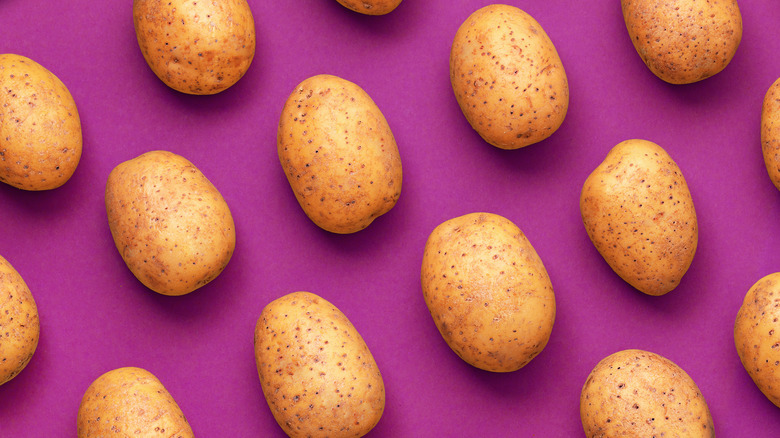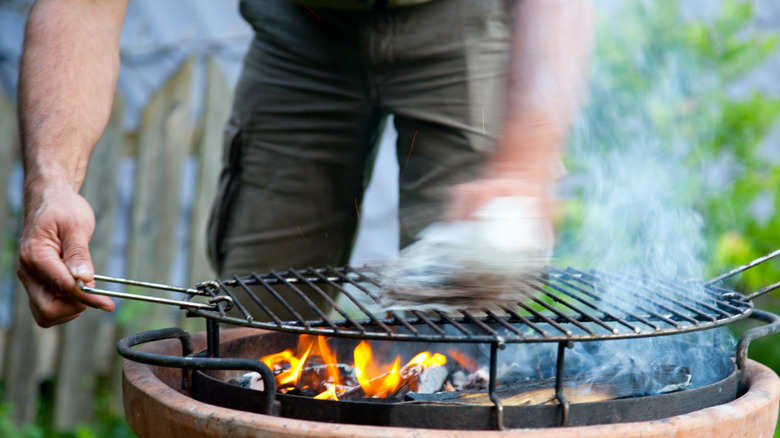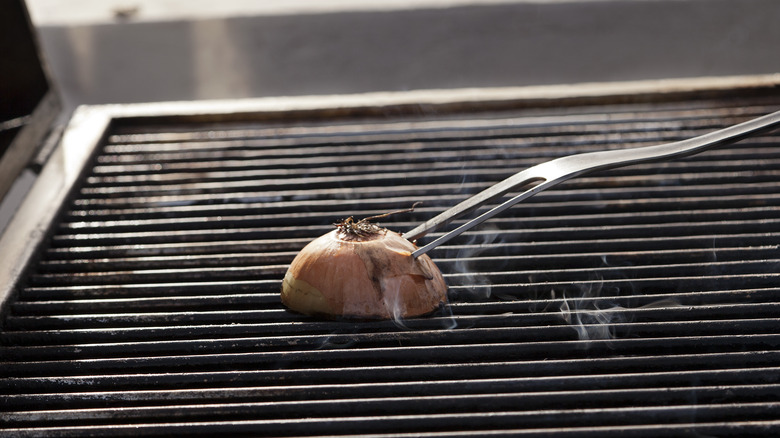Potatoes Are The Key Ingredient To Making Your Grill Nonstick
Whether you're whipping up juicy burgers, fresh corn on the cob, or a savory chicken dish like yakitori, nothing compares to grilling. It's one of the most convenient ways to impart tons of charred, smoky flavor in a flash — that is, unless your food decides to stick to the grill. This frustrating problem has ruined many dishes and is especially prevalent with low-fat lean proteins like chicken, fish, and tofu.
While specialized non-stick sprays, generous oiling, and painstakingly scraping your food from the grill are all options you can use to mitigate this issue, there's another way, and it comes from TikTok. Enter the potato trick, touted by TikTok creators like @kalejunkie. In her video series focused on grilling hacks, she mentions that you can rub your grill grates with a sliced potato to make a natural non-stick coating. Judging by the comment section, results are mixed, with some confirming that the trick works wonders, and others saying it's a dud. This variance may be explained by a bit of food science.
If food sticks to your grill, blame science
To understand why food sticks to the grill (and other cooking surfaces), it helps to know a bit of chemistry, starting with the Maillard reaction. This is the main chemical reaction involved in browning, like the golden-brown skin on Thanksgiving turkey, the toasty crust on bread, and grill marks on your t-bone steak. It starts when amino acids (the building blocks of proteins) and simple sugars are heated and broken down to form new compounds, including a sticky residue that adheres to your cooking surface. As the food loses moisture and undergoes thermal contraction, the surface dries and the Maillard reaction happens, forming a crust and releasing the stuck-on food.
Insufficient heat, as well as sweet marinades and sauces, can make the sticky situation worse. Adding fat to the equation can help — whether it comes from cooking oil or fat already in the food you're cooking — as it undergoes a process called polymerization when heated at high temperatures, forming a protective barrier to your cooking surface that keeps food from adhering. Using a potato to prep your grill works similarly. When applied to hot grates, the starches in a potato gelatinize, absorbing water, becoming sticky, and filling tiny crevices on your cooking surface to leave your food with less surface area to adhere to.
Use potatoes (and more) for a non-stick grill
If you want to try the potato experiment at home, the steps are straightforward. Start by heating your grill to about 500 degrees Fahrenheit. Then cut the potato in half. If you'd prefer not to waste a perfectly edible spud, use a heavily sprouted potato or that green potato that's been wasting away in your pantry. Spear your potato with a fork or meat fork, then rub it evenly across the hot grill grates.
Beyond the potato hack, you can use other foods to clean your grill. Onions are great grill-cleaning tools, as are lemons. Keeping your grill clean is one of the most reliable methods for preventing excessive sticking. Remember — less surface area (i.e. gunk on your grill), less for your food to stick to. Moreover, waiting for food to sear properly and perform its Maillard magic before flipping it will also decrease sticking.


